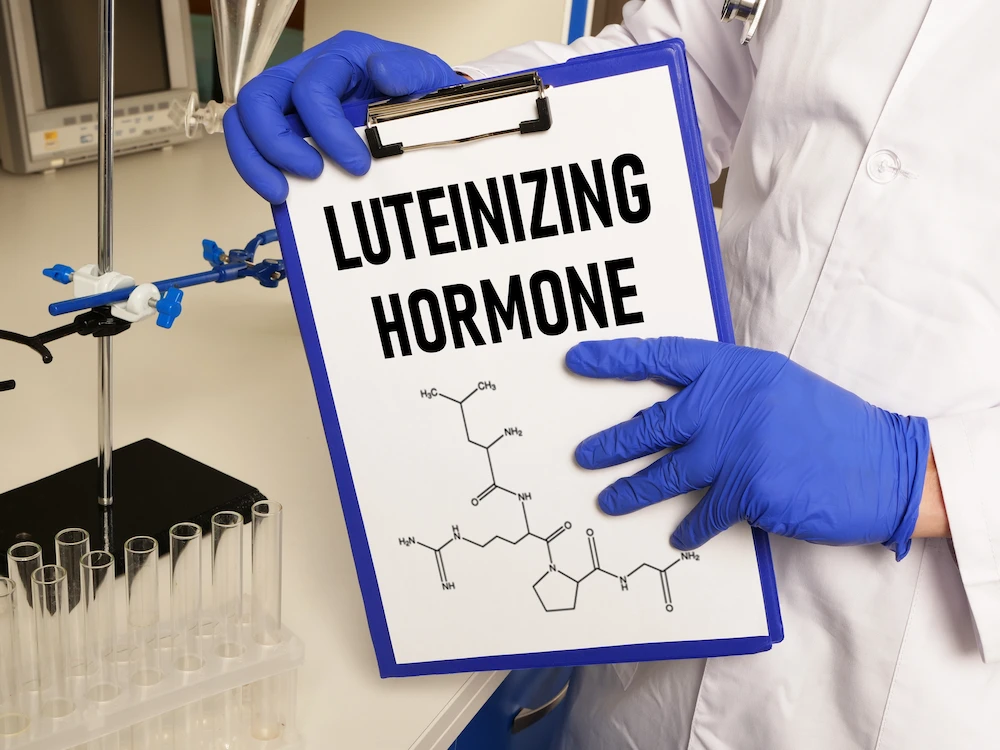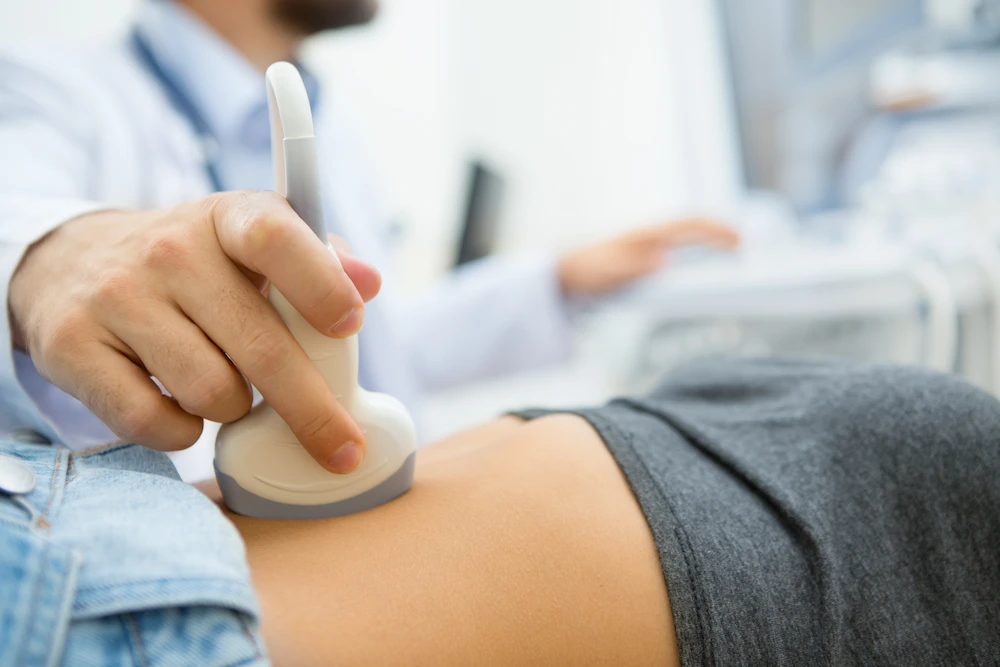How Long Does LH Stay Elevated After Ovulation?

Luteinizing hormone (LH) plays a pivotal role in the female menstrual cycle, triggering ovulation and influencing hormonal balance. But how long does LH stay elevated after ovulation? Understanding this hormonal fluctuation can be crucial for women trying to conceive, managing their menstrual cycles, or simply gaining a deeper understanding of their reproductive health.
This article delves into the intricacies of LH levels, explores the ovulation process, and provides valuable insights for women in Miami seeking to optimize their reproductive wellness.
What is LH?
Luteinizing hormone (LH) is a hormone produced by the pituitary gland in your brain. In women, LH plays a crucial role in the menstrual cycle by:
- Triggering ovulation: LH surges mid-cycle, causing the release of a mature egg from the ovary.
- Regulating progesterone production: After ovulation, LH stimulates the corpus luteum (the structure that remains after the egg is released) to produce progesterone, a hormone essential for preparing the uterus for pregnancy.
Normal LH Levels in Females
LH levels fluctuate throughout your menstrual cycle.
- Follicular Phase: LH levels are relatively low during the first half of your cycle.
- Ovulation: LH surges dramatically mid-cycle, triggering the release of an egg.
- Luteal Phase: LH levels remain elevated for a short period after ovulation, supporting progesterone production.
What LH Level Indicates Ovulation?
The LH surge, a significant increase in LH levels, typically occurs 24-48 hours before ovulation. Ovulation predictor kits (OPKs) can detect this surge, helping you pinpoint your most fertile days.
What is the LH Surge?
The LH surge is a rapid and significant increase in LH levels that triggers ovulation. This surge is essential for the release of a mature egg from the ovary.
How Long Does LH Stay Elevated After Ovulation?
After the initial surge, LH levels remain elevated for about 1-2 days before gradually declining. This elevated period supports the development of the corpus luteum and the production of progesterone.

Early Pregnancy LH Levels
If pregnancy occurs, hCG (human chorionic gonadotropin), a hormone produced by the developing placenta, will maintain the corpus luteum and continue progesterone production. LH levels will gradually decline as hCG takes over this role.
Factors Affecting LH Levels
Several factors can influence LH levels:
- Age: LH levels naturally increase as you approach menopause.
- Medications: Certain medications, such as hormonal contraceptives, can affect LH levels.
- Medical Conditions: Polycystic ovary syndrome (PCOS) and other hormonal disorders can disrupt LH production.
Primary Care Doctor and Hormone Health
If you have concerns about your LH levels or menstrual cycle, consult a primary care doctor or gynecologist. They can:
- Order blood tests to assess your hormone levels.
- Evaluate your overall health and identify any potential underlying conditions.
- Provide guidance on managing your menstrual cycle or fertility concerns.
Primary Doctor in Miami: Hiriart & Lopez MD
Hiriart & Lopez MD in Miami offers comprehensive primary care services, including hormone testing and evaluation. Our experienced physicians can help you understand your hormonal health and address any concerns.
Food Intolerance and Hormonal Imbalance
While not directly related to LH levels, food intolerances can trigger inflammation and digestive issues, potentially impacting hormonal balance. If you experience digestive discomfort, consider a food sensitivity test kit to identify potential trigger foods.
Key Takeaways:
- LH plays a crucial role in the female menstrual cycle, triggering ovulation and regulating progesterone production.
- LH levels surge before ovulation and remain elevated for a short period afterward.
- If you have concerns about your LH levels or menstrual cycle, consult a primary care doctor in Miami.
Remember, this article is intended for informational purposes only and should not be considered a substitute for professional medical advice. If you have any concerns about your health or hormone levels, consult a qualified healthcare professional.
FAQs: How Long Does LH Stay Elevated After Ovulation?
- How can I track my LH levels at home?
Ovulation predictor kits (OPKs) are readily available at drugstores and can help you detect the LH surge that occurs before ovulation. These kits typically involve testing your urine with a test strip, which indicates whether your LH levels are high or low. - My LH levels are not surging. Does this mean I’m not ovulating?
Not necessarily. While the LH surge is a key indicator of ovulation, some women might have a more subtle surge that’s not easily detected by OPKs. Other factors, such as stress or certain medical conditions, can also affect LH levels. If you’re concerned about ovulation, consult your doctor in Miami. - Can I influence my LH levels naturally?
While your body naturally regulates LH production, certain lifestyle factors can support hormonal balance. These include maintaining a healthy weight, managing stress, and getting enough sleep. - What are the signs that my LH levels might be abnormal?
Irregular menstrual cycles, difficulty conceiving, and symptoms like hot flashes or night sweats can sometimes indicate hormonal imbalances, including abnormal LH levels. If you experience these symptoms, consult your doctor in Miami for evaluation and testing. - I’m experiencing digestive issues and irregular periods. Could there be a connection?
While seemingly unrelated, digestive health and hormonal balance can be interconnected. Conditions like food intolerances can trigger inflammation and disrupt various bodily functions, potentially affecting hormone production and menstrual cycles. If you experience both digestive and hormonal issues, it’s worth discussing your concerns with your doctor.
Contact Us
Hiriart & Lopez MD, LLC
9950 SW 107th Ave STE 101,
Miami, FL 33176
305-274-8779
Phone: (305) 274-8779
Fax: (305) 274-0646
OPENING HOURS
Monday 7:30 AM–4:30 PM
Tuesday 7:30 AM–4:30 PM
Wednesday 7:30 AM–4:30 PM
Thursday 7:30 AM–4:30 PM
Friday 7:30–11 AM
Saturday Closed
Sunday Closed
OFFICE LOCATION
How Long Does LH Stay Elevated After Ovulation?

Luteinizing hormone (LH) plays a pivotal role in the female menstrual cycle, triggering ovulation and influencing hormonal balance. But how long does LH stay elevated after ovulation? Understanding this hormonal fluctuation can be crucial for women trying to conceive, managing their menstrual cycles, or simply gaining a deeper understanding of their reproductive health.
This article delves into the intricacies of LH levels, explores the ovulation process, and provides valuable insights for women in Miami seeking to optimize their reproductive wellness.
What is LH?
Luteinizing hormone (LH) is a hormone produced by the pituitary gland in your brain. In women, LH plays a crucial role in the menstrual cycle by:
- Triggering ovulation: LH surges mid-cycle, causing the release of a mature egg from the ovary.
- Regulating progesterone production: After ovulation, LH stimulates the corpus luteum (the structure that remains after the egg is released) to produce progesterone, a hormone essential for preparing the uterus for pregnancy.
Normal LH Levels in Females
LH levels fluctuate throughout your menstrual cycle.
- Follicular Phase: LH levels are relatively low during the first half of your cycle.
- Ovulation: LH surges dramatically mid-cycle, triggering the release of an egg.
- Luteal Phase: LH levels remain elevated for a short period after ovulation, supporting progesterone production.
What LH Level Indicates Ovulation?
The LH surge, a significant increase in LH levels, typically occurs 24-48 hours before ovulation. Ovulation predictor kits (OPKs) can detect this surge, helping you pinpoint your most fertile days.
What is the LH Surge?
The LH surge is a rapid and significant increase in LH levels that triggers ovulation. This surge is essential for the release of a mature egg from the ovary.
How Long Does LH Stay Elevated After Ovulation?
After the initial surge, LH levels remain elevated for about 1-2 days before gradually declining. This elevated period supports the development of the corpus luteum and the production of progesterone.

Early Pregnancy LH Levels
If pregnancy occurs, hCG (human chorionic gonadotropin), a hormone produced by the developing placenta, will maintain the corpus luteum and continue progesterone production. LH levels will gradually decline as hCG takes over this role.
Factors Affecting LH Levels
Several factors can influence LH levels:
- Age: LH levels naturally increase as you approach menopause.
- Medications: Certain medications, such as hormonal contraceptives, can affect LH levels.
- Medical Conditions: Polycystic ovary syndrome (PCOS) and other hormonal disorders can disrupt LH production.
Primary Care Doctor and Hormone Health
If you have concerns about your LH levels or menstrual cycle, consult a primary care doctor or gynecologist. They can:
- Order blood tests to assess your hormone levels.
- Evaluate your overall health and identify any potential underlying conditions.
- Provide guidance on managing your menstrual cycle or fertility concerns.
Primary Doctor in Miami: Hiriart & Lopez MD
Hiriart & Lopez MD in Miami offers comprehensive primary care services, including hormone testing and evaluation. Our experienced physicians can help you understand your hormonal health and address any concerns.
Food Intolerance and Hormonal Imbalance
While not directly related to LH levels, food intolerances can trigger inflammation and digestive issues, potentially impacting hormonal balance. If you experience digestive discomfort, consider a food sensitivity test kit to identify potential trigger foods.
Key Takeaways:
- LH plays a crucial role in the female menstrual cycle, triggering ovulation and regulating progesterone production.
- LH levels surge before ovulation and remain elevated for a short period afterward.
- If you have concerns about your LH levels or menstrual cycle, consult a primary care doctor in Miami.
Remember, this article is intended for informational purposes only and should not be considered a substitute for professional medical advice. If you have any concerns about your health or hormone levels, consult a qualified healthcare professional.
FAQs: How Long Does LH Stay Elevated After Ovulation?
- How can I track my LH levels at home?
Ovulation predictor kits (OPKs) are readily available at drugstores and can help you detect the LH surge that occurs before ovulation. These kits typically involve testing your urine with a test strip, which indicates whether your LH levels are high or low. - My LH levels are not surging. Does this mean I’m not ovulating?
Not necessarily. While the LH surge is a key indicator of ovulation, some women might have a more subtle surge that’s not easily detected by OPKs. Other factors, such as stress or certain medical conditions, can also affect LH levels. If you’re concerned about ovulation, consult your doctor in Miami. - Can I influence my LH levels naturally?
While your body naturally regulates LH production, certain lifestyle factors can support hormonal balance. These include maintaining a healthy weight, managing stress, and getting enough sleep. - What are the signs that my LH levels might be abnormal?
Irregular menstrual cycles, difficulty conceiving, and symptoms like hot flashes or night sweats can sometimes indicate hormonal imbalances, including abnormal LH levels. If you experience these symptoms, consult your doctor in Miami for evaluation and testing. - I’m experiencing digestive issues and irregular periods. Could there be a connection?
While seemingly unrelated, digestive health and hormonal balance can be interconnected. Conditions like food intolerances can trigger inflammation and disrupt various bodily functions, potentially affecting hormone production and menstrual cycles. If you experience both digestive and hormonal issues, it’s worth discussing your concerns with your doctor.
Contact Us
Hiriart & Lopez MD, LLC
9950 SW 107th Ave STE 101,
Miami, FL 33176
305-274-8779
Phone: (305) 274-8779
Fax: (305) 274-0646
OPENING HOURS
Monday 7:30 AM–4:30 PM
Tuesday 7:30 AM–4:30 PM
Wednesday 7:30 AM–4:30 PM
Thursday 7:30 AM–4:30 PM
Friday 7:30–11 AM
Saturday Closed
Sunday Closed

